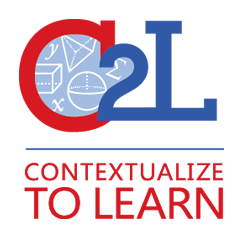Useful Websites and Online Resources
UW LaCrosse – Problems of Practice
This is a website from UW-LaCrosse where employers, policymakers, and other community members can propose real-world projects or problems that faculty can incorporate into their courses.
Three Act Math
This is a curriculum resource to use with students when introducing math concepts.
In particular, here are some “favorites” –
- Dan Meyer’s introductory blogpost to how to implement a 3-act task: http://blog.mrmeyer.com/2011/the-three-acts-of-a-mathematical-story/
- Dan Meyer’s 3-Act Math Lesson Library (google spreadsheet): https://docs.google.com/spreadsheets/d/1jXSt_CoDzyDFeJimZxnhgwOVsWkTQEsfqouLWNNC6Z4/pub?output=html#
- Andrew Stadel’s 3-Act Math Lesson Library (google spreadsheet): https://docs.google.com/spreadsheets/d/19sms4MpuAOO71o4qFPJyVKK-OGLnNegMgSL6WAwIdb8/edit#gid=0
- Robert Kaplinsky’s lesson library (on his blog): http://robertkaplinsky.com/lessons/
- Graham Fletchy 3-Act lesson library (on his blog): https://gfletchy.com/3-act-lessons/
MIT RESOURCE LIBRARY
As a support for contextualization in higher-level math, this resource library from MIT with some excellent videos ranging from general problem solving and linearity through derivatives and differential equations.
Interesting Publications and Research
Gehrke, S., & Kezar, A. (2017). The roles of STEM faculty communities of practice in institutional and departmental reform in higher education. American Educational Research Journal. Advance online publication. doi:10.3102/0002831217706736
This study looked at involvement in communities and how it related to departmental and institutional change. Prolonged involvement, presenting about the community to others, and community leadership and culture were positively associated with change. Also, motivation to lead and support of institutional leadership were related to overall reform in STEM. Faculty appointment and institution type did not contribute to departmental or institutional change.
Wang, X., Sun, N., & Wickersham, K. (2017). Turning math remediation into “homeroom:” Contextualization as a motivational environment for community college students in remedial math. The Review of Higher Education, 40(3), 427-464. doi:10.1353/rhe.2017.0014
This study focused on a particular instructional approach, math contextualization, and how it influenced students’ course experiences and motivational beliefs around math ability and future success, as well as the pros and cons of a contextualized approach to teaching remedial math in occupational programs at community colleges. Overall, students report positive experiences and enhanced self-confidence in math. Although there were minor challenges around implementing contextualization, it proves to be a promising approach.
